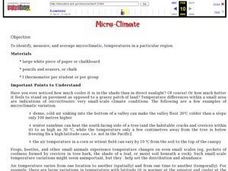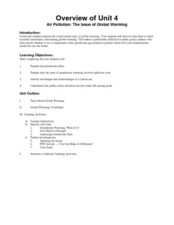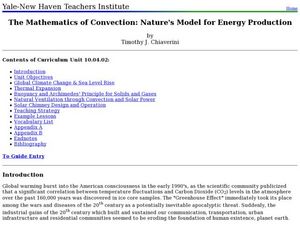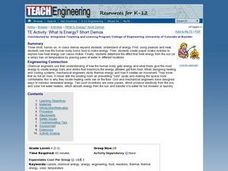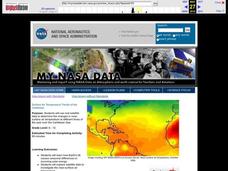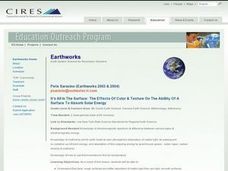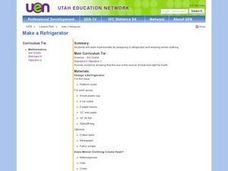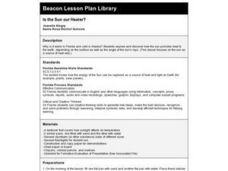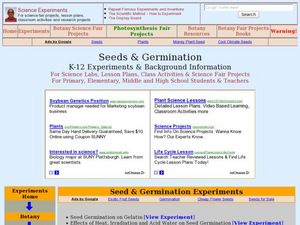Curated OER
Earth's Atmosphere and Temperature
Learners explore the layers of earth's atmosphere and conduct an experiment to identify carbon dioxide. They construct models using styrofoam to represent molecules in the atmosphere's layers. To discover how sunlight efffects...
Curated OER
Micro-Climate
Atmosphere aces investigate the microclimates that exist within a larger area. They use a thermometer to record the varying temperatures and identify the microclimates on a map that they have drawn. This exercise helps them to understand...
Curated OER
Air Pollution: The Issue of Global Warming
Here is an outstanding 10-page lesson plan on global warming. Learners discover that there is a lot of controversy surrounding this topic in that the science behind global warming is difficult to prove. The best thing about this plan is...
Curated OER
A Comparison of Land and Water Temperature
Students examine NASA satellite observations of surface temperature and investigate the seasonal changes of land and water temperature.
Wild BC
The Greenhouse Effect: Warming the Earth Experiment
First in a two-part lesson on the greenhouse effect, this lesson involves a classroom demonstration of the phenomenon, and a lab group experiment with color and absorption. Although there are easier ways to demonstrate the greenhouse...
Curated OER
How Much Energy Does the Earth Receive from the Sun?
Students explore energy. In this science lesson plan, students conduct an experiment in which they measure how much energy is produced by the sun. Students build a calorimeter to measure the amount of energy.
Curated OER
Sun Friendly Homes
Students design and build a model solar energy home. For this technology lesson, students test the efficiency of their model houses by measuring temperature at regular intervals. They analyze data and share results with the class.
Curated OER
The Mathematics of Convection: Nature's Model for Energy Production
High schoolers conduct a series of experiments to investigate density, buoyancy and climate. In this math lesson, pupils design and build a hot air balloon to demonstrate convection. They research and write a paper about solar chimneys.
Curated OER
What Is Energy? Short Demos
Students engage in three short, hands-on, in-class demos which expand students' understand of energy. First, using peanuts and heat, students see how the human body burns food to make energy. Then, they create paper snake mobiles to...
Curated OER
Using Vegetation, Precipitation, and Surface Temperature to Study Climate Zones
Students begin their examination of the climate zones found around the world. Using a software program, they identify the relationship between the vegetation, climate and temperatures of the different zones. They also plot coordinates...
Curated OER
Surface Air Temperature Trends of the Caribbean
Students investigate the seasonal changes to sea surface and near-surface air temperatures near the equator. They use actual satellite data to track and graph the differences in air and sea temperatures during different seasons in the...
Curated OER
It's All In The Surface: The Effects Of Color & Texture On The Ability Of A Surface To Absorb Solar Energy
Ninth graders examine how dark surfaces absorb more light than light surfaces. They perform an experiment that compares various surfaces abilities to absorb heat, then record and analyze the results.
Curated OER
Sunlight and Warm Air
Young scholars examine the different ways heat can be felt. In this radiation and conduction instructional activity, students recognize that the sun radiates heat. Young scholars conduct three experiments to find how the sun warms...
Curated OER
Temperature Changes: Atmosphere & Ocean
Young scholars observe temperature differences of water and air in sunlight and darkness. They determine that the sun warms the Earth's surface, which controls global currents and climate, keeping the earth habitable. They discover water...
Curated OER
A Comparison of Land and Water Temperature
Learners use the NASA website's Live Access Server to create a graph of surface temperature at two locations on earth. They analyze the data and then answer specific questions provided in this lesson. They also examine and compare the...
Curated OER
Lake Effect
Fourth graders explore some of the effects Great Salt Lake has on Utah's local weather/temperature moderation, lake effect storms, and temperature inversions. They observe the differences of specific heat between soil and water and...
Curated OER
Heat Absorption and Radiation
Middle schoolers experiment with the concepts of absorption and reflection of radiant energy.
Curated OER
Make a Refrigerator
Third graders explore the concept of heat transfer as experienced in wearing winter clothing and analyzing the refrigerator.
Curated OER
IS THE SUN OUR HEATER?
Students explore and discover how the sun provides heat to the earth, depending on the surface as well as the angle of the sun's rays.
Curated OER
Seeds & Germination
Students study the types and parts of seeds and how they have evolved. In this germination lesson students complete experiments that show the effects of variables role in seed germination.
Curated OER
Build Your Own Weather Station
Studens experiment with temperatures. In this science lesson plan, students make their own weather station by heating one bottle and keeping the water in another bottle at room temperature.
Curated OER
Nature's Air Conditioner
Students observe the process of transpiration in leaves. They measure how much water a leaf gives off in a 24-hour period, calculate the volume, and answer discussion questions.
Curated OER
Cold Front Characteristics
Students study weather characteristics of a cold front passage. They view animations of several atmospheric variables (e.g., temperature, rainfall) during a cold front passage and locate the front, determine its direction of movement,...
Curated OER
Create a Cloud in a Bottle
Students look at how clouds form. In this cloud lesson, students make a cloud using water, 2 liter bottles and a match. They watch how the pressure and temperature changes the atmosphere in the bottle to create a cloud.

